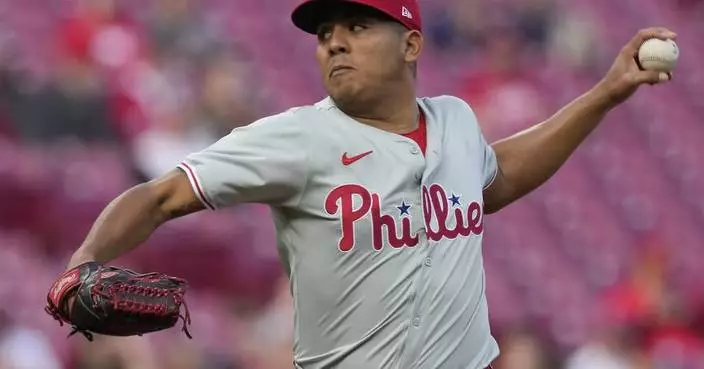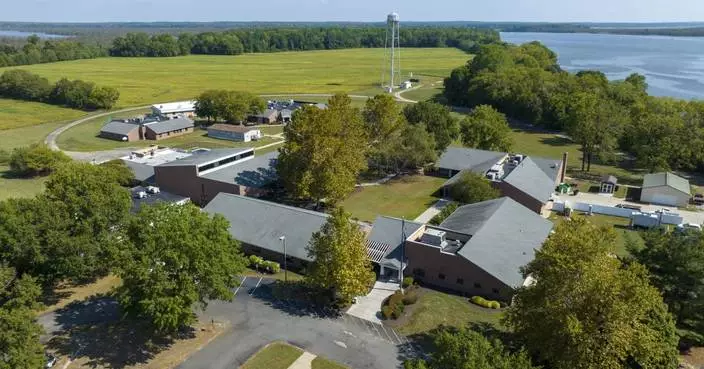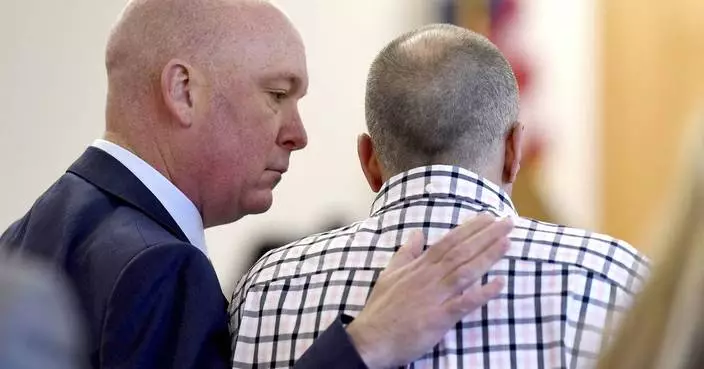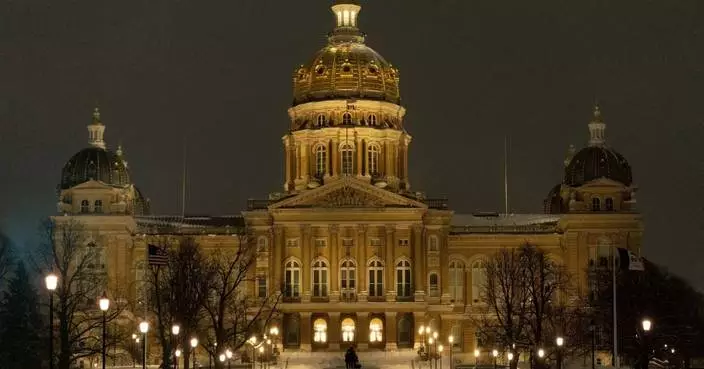Simone Biles watched as her friends and former Olympic teammates came forward to detail abuse at the hands of a now-imprisoned former USA Gymnastics team doctor.
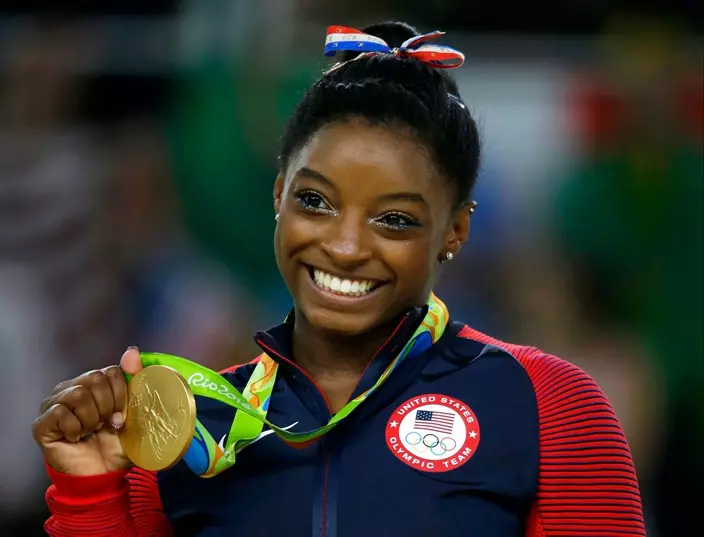
FILE - In this Aug. 16, 2016 file photo, United States gymnast Simone Biles displays her gold medal for floor during the artistic gymnastics women's apparatus final at the 2016 Summer Olympics in Rio de Janeiro, Brazil. (AP Photo/Rebecca Blackwell, File)
Drawing in part from their strength, the four-time gold medalist acknowledged Monday she is among the athletes who were sexually abused by Larry Nassar.
Biles, who won five medals overall at the 2016 Olympics, released a statement via Twitter outlining that abuse. Nassar, who spent more than two decades as a physician at USA Gymnastics while also working at Michigan State University, has admitted sexually assaulting gymnasts, possessing child pornography and molesting girls who sought medical treatment. He was sentenced in December to 60 years in federal prison for possessing child pornography and is facing another 40 to 125 years in prison after pleading guilty to assaulting seven girls.
Biles, now 20, called Nassar's behavior "completely unacceptable, disgusting, and abusive, especially from someone whom I was told to trust." She joins a list of high-profile gymnasts who have come out against Nassar, including six-time Olympic medalist Aly Raisman, 2012 all-around champion Gabby Douglas and two-time Olympic medalist McKayla Maroney.
Like her Olympic teammates, Biles detailed abuse by Nassar that he disguised as treatment.
"It is not normal to receive any type of treatment from a trusted team physician and refer to it horrifyingly as the 'special' treatment," Biles wrote.
Biles is in the beginning stages of a return to competition, a journey that includes visits to the national team's training center at the Karolyi Ranch north of Houston, where she said the abuse occurred.
"It is impossibly difficult to relive these experiences and it breaks my heart even more to think that as I work towards my dream of competing in Tokyo 2020, I will have to continually return to the same training facility where I was abused," Biles wrote.
USA Gymnastics initially agreed to buy the Karolyi Ranch in the summer of August 2016, following the retirement of longtime national team coordinator Martha Karolyi, but then backed out of the deal. The national team continues to use the facility while options for a replacement are explored.
Biles says she initially wondered if she was to blame.
"For too long I've asked myself, 'Was I too naive? Was it may fault?'" Biles wrote. "I now know the answer to those questions. No. No. It was not my fault. No, I will not and should not carry the guilt that belongs to Larry Nassar, USAG, and others."
USA Gymnastics said in a statement it is "heartbroken, sorry and angry" that Biles and other athletes were harmed by Nassar.
"USA Gymnastics' support is unwavering for Simone and all athletes who courageously came forward to share their experiences," the organization said in a release. "We are our athletes' advocates. USA Gymnastics will continue to listen to our athletes and our members in our efforts of creating a culture of empowerment with a relentless focus on athlete safety every single day."
The organization has taken several steps in recent months. President and CEO Steve Penny resigned under pressure last March and was replaced by Kerry Perry, who took over on Dec. 1.
The organization hired Toby Stark, a child welfare advocate, as its director of SafeSport last summer. Part of Stark's mandate is educating members on rules, educational programs and reporting. The federation also adopted over 70 recommendations by Deborah Daniels, a former federal prosecutor who oversaw an extensive independent review.
That's not far enough for some. Raisman has urged the organization to remove chairman of the board Paul Parilla among others. Biles, like Raisman, wants USA Gymnastics to take a deeper look at the conditions that allowed Nassar's behavior to run unchecked for so long.
"We need to know why this was able to take place for so long and to so many of us," Biles said. "We need to make sure something like this never happens again."
WASHINGTON (AP) — On the left and right, Supreme Court justices seem to agree on a basic truth about the American system of government: No one is above the law, not even the president.
“The law applies equally to all persons, including a person who happens for a period of time to occupy the Presidency,” Justice Samuel Alito wrote in 2020.
Less than a year earlier, Justice Ketanji Brown Jackson, then a federal trial judge, wrote, “Stated simply, the primary takeaway from the past 250 years of recorded American history is that Presidents are not kings.”
But former President Donald Trump and his legal team are putting that foundational belief to the test on Thursday when the high court takes up the Republican’s bid to avoid prosecution over his efforts to overturn his 2020 election loss to Democrat Joe Biden.
Trump’s lawyers argue that former presidents are entitled to absolute immunity for their official acts. Otherwise, they say, politically motivated prosecutions of former occupants of the Oval Office would become routine and presidents couldn't function as the commander in chief if they had to worry about criminal charges.
Lower courts have rejected those arguments, including a unanimous three-judge panel on an appeals court in Washington, D.C. And even if the high court resoundingly follows suit, the timing of its decision may be as important as the outcome. That’s because Trump, the presumptive 2024 Republican presidential nominee, has been pushing to delay the trial until after the November election, and the later the justices issue their decision, the more likely he is to succeed.
The court typically issues its last opinions by the end of June, which is roughly four months before the election.
The election interference conspiracy case brought by special counsel Jack Smith in Washington is just one of four criminal cases confronting Trump, the first former president to face prosecution. He already is standing trial in New York on charges that he falsified business records to keep damaging information from voters when he directed hush money payments to a former porn star to keep quiet her claims that they had a sexual encounter.
Smith’s team says the men who wrote Constitution never intended for presidents to be above the law and that, in any event, the acts Trump is charged with — including participating in a scheme to enlist fake electors in battleground states won by Biden — aren’t in any way part of a president’s official duties.
Nearly four years ago, all nine justices rejected Trump’s claim of absolute immunity from a district attorney’s subpoena for his financial records. That case played out during Trump’s presidency and involved a criminal investigation, but no charges.
Justice Clarence Thomas, who would have prevented the enforcement of the subpoena because of Trump’s responsibilities as president, still rejected Trump’s claim of absolute immunity and pointed to the text of the Constitution and how it was understood by the people who ratified it.
“The text of the Constitution … does not afford the President absolute immunity,” Thomas wrote in 2020.
The lack of apparent support on the court for the sort of blanket immunity Trump seeks has caused commentators to speculate about why the court has taken up the case in the first place.
Phillip Bobbitt, a constitutional scholar at Columbia University’s law school, said he worries about the delay, but sees value in a decision that amounts to “a definitive expression by the Supreme Court that we are a government of laws and not of men.”
The court also may be more concerned with how its decision could affect future presidencies, Harvard law school professor Jack Goldsmith wrote on the Lawfare blog.
But Kermit Roosevelt, a law professor at the University of Pennsylvania, said the court never should have taken the case because an ideologically diverse panel of the federal appeals court in Washington adequately addressed the issues.
"If it was going to take the case, it should have proceeded faster, because now, it will most likely prevent the trial from being completed before the election. Even Richard Nixon said that the American people deserve to know whether their president is a crook. The Supreme Court seems to disagree,” Roosevelt said.
The court has several options for deciding the case. The justices could reject Trump's arguments and unfreeze the case so that U.S. District Judge Tanya Chutkan can resume trial preparations, which she has indicated may last up to three months.
The court could end Smith's prosecution by declaring for the first time that former presidents may not be prosecuted for official acts they took while in office.
It also might spell out when former presidents are shielded for prosecution and either declare that Trump's alleged conduct easily crossed the line or return the case to Chutkan so that she can decide whether Trump should have to stand trial.
Follow the AP's coverage of the U.S. Supreme Court at https://apnews.com/hub/us-supreme-court.
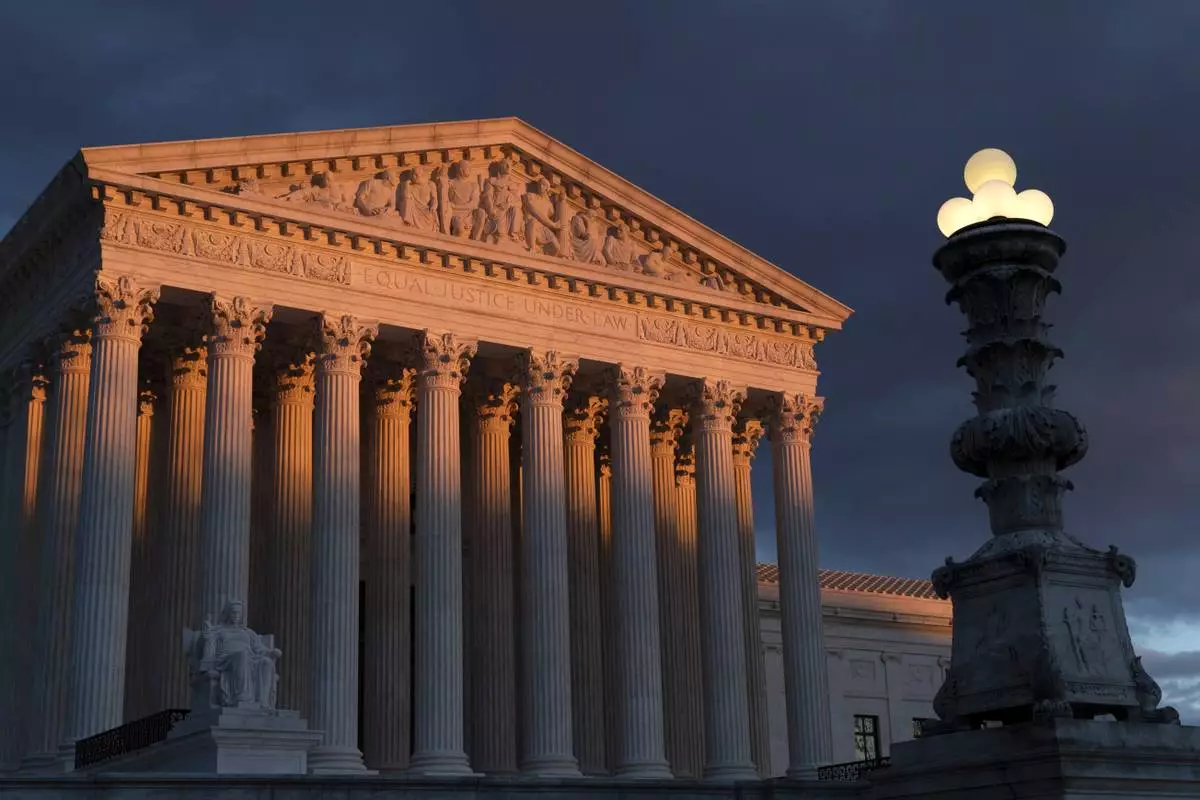
FILE - The Supreme Court is seen at sunset in Washington, on Jan. 24, 2019. On the left and right, Supreme Court justices seem to agree on a basic truth about the American system of government: No one is above the law, not even the president. (AP Photo/J. Scott Applewhite)








